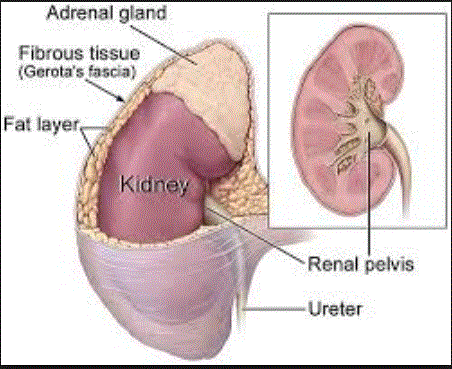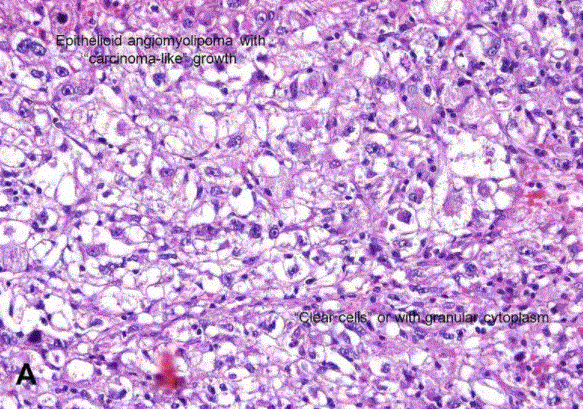What is Angiomyolipoma?
Angiomyolipoma is a non-cancerous tumor that consists of smooth muscles, fat and blood vessels. It is also known as renal angiomyolipoma and Kidney AML. This tumor can affect many parts of your body but it commonly affects your kidney.

Renal angiomyolipoma is the most prevalent tumor of the kidney. It affects cortex or medulla parts of your kidney. Normally your kidney is made of two parts called medulla and cortex. The cortex is the outer part of the kidney while medulla is the part found in the middle or center of the kidney.
Angiomyolipoma mostly affects people between the ages of 35-55 years and it occurs in both genders. In some rare cases, children are also affected.
Causes & Risk Factors
Research has not yet indentified the real cause of angiomyolipoma. But most of the researches have shown that perivascular epithelioid cells are responsible for formation of these tumors. The following factors can promote formation of angiomyolipoma tumor in people:
Tuberous sclerosis
It is an inherited condition. It occurs when genes TSC1 and TSC2 are altered through mutation. Tuberous sclerosis can form various types of tumors including rhabdomyomas, oncocytomas, and angiofibromas in different locations of the body.
Other conditions that can increase chances of angiomyolipoma developing in your body include:
- Von Recklinghausen disease
- Von Hippel-Lindau disease
- Sturge-Weber syndrome
- autosomal dominant polycystic kidney disease
Symptoms
Symptoms of angiomyolipoma are different among people. These symptoms also rely on the size and place of the tumor in the body. Generally; small tumors do not show symptoms while large ones exhibit symptoms.
One of the symptoms of this tumor is that it affects the cortex and medulla parts of your kidney. It can also affect areas near to the soft tissues of the kidney.
The tumor can also occur in your abdomen forming an abdominal mass. The tumor may also elevate blood pressure in some people and others can have blood in the urine.
Large tumor can compress nearby organs and structures hence affecting their performance in the body.
For tuberous sclerosis condition, some people may have difficult in studying. They may also have poor blood circulation around the body because the heart is damaged.
This condition can also affect your eyes especially by making the retina to develop white patches. Other people may develop red spots on their faces and unusual patches on the skin.2
Diagnosis
Most of the tumors are sporadic while few result from an underlying condition or syndrome. The following tests can be conducted to diagnose angiomyolipoma:

Physical examination
A thorough physical assessment and medical history will be conducted. If you have tuberous sclerosis, your doctor will examine its symptoms. This will assist your doctor to diagnoses angiomyolipoma.
Kidney function tests
These tests are done to determine if your kidneys are functioning properly. To do this your doctor will perform tests to find out how your kidneys are removing waste from your body. These tests include:
Urinalysis
It is a test performed to determine presence of protein in your urine. Your doctor can take a sample of your urine and analyze it to check for blood cells in the urine. If urine has blood cells such as white blood cells, it may indicate you have a tumor, kidney disease or urinary tract infections.
Intravenous pyelogram
This test uses x-rays and a dye which is injected through your vein to take pictures of your kidney, bladder and urethra. Your doctor performs this test to determine presence of tumors in your kidney, bladder and urethra.4
Imaging tests
Your doctor can use imaging tests to check for tumors in your kidney or determine if cancer has spread to other parts in your body. Your doctor can use the following imaging tests:1,2,5
Magnetic resonance imaging MRI Scan
MRI scan is used to take detailed pictures of your kidney, bladder and urethra. Your doctor assesses the pictures to look for tumor or growths in your kidney, bladder and urethra. MRI scan can also show if cancer has spread to other areas of your body.5
Ultrasound scan
This scan uses high frequency sound waves to take detailed pictures of your abdomen, gallbladder and kidneys. Your doctor assesses these pictures to find out growths or tumors in your abdomen, gallbladder and kidneys.
Biopsy
Your doctor may take a sample of your kidney tissues and analyze it in the laboratory. Depending on the results, your doctor can recommend further tests to confirm diagnosis of angiomyolipoma.

In addition, your doctor can perform other tests to rule out other tumors before confirming the diagnosis of angiomyolipoma.
Complications
Angiomyolipoma of the kidney may lead to the following complications:
Depression and stress
People with this tumor may be stressed or depressed because of worrying about developing kidney cancer.
Infections
This tumor can grow bigger overtime and attract bacteria and fungi which may cause infections in your kidney.
Retroperitoneal hemorrhage
In case this tumor bleeds suddenly, you may develop retroperitoneal hemorrhage. This can lead to excessive loss of blood and if not treated urgently can cause death.
People with retroperitoneal hemorrhage may have nausea, pain in the back and decreased blood pressure.
Kidney failure
This tumor can also cause your kidney to fail completely. This is due to the force exerted by this tumor on the kidney tissues which can eventually damage these tissues.
Treatment
Surgery is the best option to treat angiomyolipoma. Your doctor can perform any of the following surgical procedures to remove the tumor:
Radical nephrectomy
This procedure is used to remove the entire kidney if it is affected. You will use the other kidney without problems.
Partial nephrectomy
In this procedure, your doctor removes the part of your kidney that is affected by the tumor. In most cases, partial nephrectomy is used to treat early kidney cancers.
Kidney transplant
If tumors affect both of your kidneys, your doctor may recommend kidney transplant. The doctor will find a compatible kidney donor especially from your family members.
Kidney dialysis
Dialysis is a treatment done to enable your kidney function properly. In this procedure, your doctor conducts surgery and puts a plastic tube in your abdomen. This tube collects excess fluid and waste materials, which are then drained out. This helps your kidney to perform its functions well.
Prevention
Go for regular screening to help detect tumors and prevent cancer from developing.
Reference List
- Angiomyolipoma of Kidney. http://www.dovemed.com/diseases-conditions/angiomyolipoma-kidney/
- Kidney angiomyolipoma imaging. http://emedicine.medscape.com/article/376848-overview#a3
- Kidney function tests. http://www.healthline.com/health/kidney-function-tests#overview1
- Intravenous pyelogram (IVP). https://stanfordhealthcare.org/medical-conditions/cancer/bladder-cancer/bladder-cancer-diagnosis/ivp.html
- MRI for Cancer. https://www.cancer.org/treatment/understanding-your-diagnosis/tests/mri-for-cancer.html
- Surgery for Kidney Cancer.https://www.cancer.org/cancer/kidney-cancer/treating/surgery.html
- Kidney dialysis. https://www.kidney.org/atoz/content/dialysisinfo
Similar Posts:
- Wilm’s Tumor
- Renal Cell Cancer
- Angiolipoma
- Appendix Cancer – Symptoms, Survival Rate, Prognosis, Treatment,
- Adrenal Adenoma
- Rhabdoid Tumor
- Urothelial Carcinoma






Leave a Reply